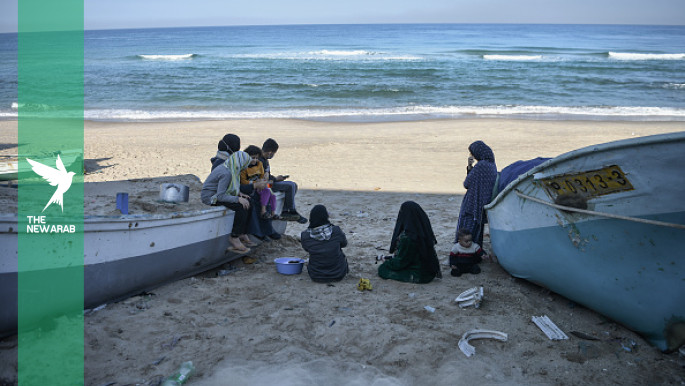Egyptians are filling bottles with food and sending them into the sea in the hopes that it reaches Palestinians starved by Israel [Getty]
Egyptians horrified by the scenes of starvation coming out of Gaza have launched a symbolic initiative named “From Sea to Sea – a Bottle of Hope for Gaza”.
The initiative has seen Egyptians fill one- and two-litre bottles with grains, rice, lentils, and other dry food supplies, before placing them in the Mediterranean Sea in the hope that they will reach Gaza.
Participants in the initiative said that it came as a desperate measure to overcome Israel’s crippling siege, which has seen trucks of emergency aid being stopped at border crossings while hundreds of thousands starve.
Those taking part have also called on people in countries bordering the Mediterranean, including Libya, Tunisia, Algeria, and Morocco, to get involved.
According to local Arabic media, the idea was inspired by the “message in a bottle” method and has since garnered widespread praise, particularly on social media platforms.
The idea was reportedly proposed by an Egyptian academic and engineer based in Japan, who suggested that delivering food across the sea was the most practical method, given the ongoing blockade on Gaza.
In a Facebook post, he explained that a tightly sealed 25-litre plastic jerrycan can hold approximately six to eight kilograms of food, leaving an air gap of around eight litres to ensure buoyancy.
He added that the containers should be released at least four kilometres from the coast, at a 60-degree angle to the northeast, to bypass opposing currents.
“Surface currents in the eastern Mediterranean flow from west to east, at a speed of up to 0.8km/h, meaning the containers could reach the shores of Gaza within 72-96 hours, if sent from areas such as Damietta or east of Port Said,” the post read.
Many online users saw the post and expressed hope, before going on to share videos of people who took on his suggestion.
Some dubbed it a “sincere expression” in the face of the “impotence of governments”.
Others said that symbolic initiatives should be turned into effective popular pressure, by supporting trusted relief organisations and demanding urgent international action to break the blockade and open crossings to allow in vital aid.
Mass starvation
The latest developments come as over 100 aid organisations raised serious concerns over the “mass starvation” in Gaza.
Over 950 trucks worth of aid are believed to be blocked at the border between Egypt and Gaza, while the UN said this week that Israeli forces have killed over 1,000 Palestinians trying to get food since the US and Israel-backed Gaza Humanitarian Foundation took control of operations in May.
Organisations including Save the Children, Oxfam and Doctors Without Borders said their colleagues in the Strip were also “wasting away” from hunger.
The World Health Organisation’s chief, Tedros Adhanom Ghebreyesus, called the malnutrition in Gaza “man-made,” as Israel continues its violent assaults on the Strip.
Israel’s genocidal war on Gaza has killed at least 59,219 Palestinians since October 2023, according to figures from the Gaza health ministry. The true death toll is believed to be much higher, with thousands of uncounted victims trapped under the rubble of destroyed buildings.

